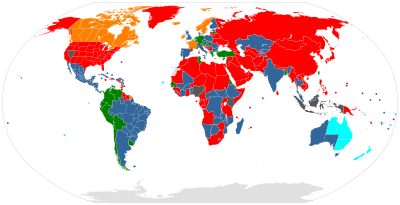Sex work
In 2004, a Medline search and review of 681 "prostitution" articles was conducted in order to create a global typology of types of sex work using arbitrary categories.
[13] Fear of legal ramifications can deter sex workers from seeking proper sexual health care services and discourage them from reporting crimes of which they were the victim.
According to research conducted by Human Rights Watch, criminalization has sex workers more vulnerable to rape, murder, and discrimination due to their marginalized position and ability to be prosecuted by the police even if they come forward as a victim.
The red light district in Amsterdam, the Netherlands, is an example of full legalization, where all aspects of sex work are allowed as long as they are registered with the government.
Since the registration process is often expensive and time-consuming, requires legal residence, and may involve regular medical exams, the most marginalized sex workers have to remain illegal, and usually charge less, because they cannot comply with the regulations.
[17] Starting in August 2015, Amnesty International, a global movement free of political, religious, or economic interests to protect people from abuse, introduced a policy that requested that all countries decriminalized sex work.
It was not until the Renaissance and the Protestant Reformation in the 16th century that attitudes turned against prostitution on a large scale and bodies began to be regulated more heavily.
Red-light districts formed in the 19th century in major cities across the country in an attempt by sex workers to find spaces where they could work, isolated from outside society and corresponding stigma.
Despite sex workers' efforts, social reformers looking to abolish prostitution outright began to gain traction in the early 20th century.
New laws focused on the third-party businesses where prostitution took place, such as saloons and brothels, holding the owners culpable for the activities that happened within their premises.
[25] Subsequently, at the start of the First World War, a Navy decree forced the closure of sex-related businesses in close proximity to military bases.
COYOTE (Call Off Your Old Tired Ethics) and other similar groups formed in the 1970s and 80s to push for women's sexual freedom and sex workers' rights.
Across all of these narratives, we typically see a gendered hierarchy in which women of various ages are shown as the sex workers and men are portrayed as the authoritative role of pimps, clients, and law enforcers.
[41] Some sex workers have carried on regardless however, also because some virtual sexual services may require an official bank account (or other means of receiving money digitally) and an own private room.
With increased global health risks associated with the pandemic, sex workers' in-person services were suspended, posing more financial stressors to an already poverty-stricken population.
COVID-19 regulations have specifically posed more threats to the physical and financial safety of socially disadvantaged sex workers who are undocumented, transgender, and of color.
[47] Several of the women who perform sex work on OnlyFans have regulars that they know everything about from their job description to family member names, to when their surgical procedures are.
Subscribers to OnlyFans sex work accounts have stated that they can get pornography for free anywhere, and that they are paying for a service catered to their personal needs.
For women sex workers, achieving this perception necessitates a performance of gender and sexuality that involves deference to clients and affirmation of their masculinity, as well as physical embodiment of traditional femininity.
These institutional barriers included long wait times, limited hours of operation, and biased treatment or discrimination on behalf of health care providers.
The title "sex worker" itself was introduced in an attempt to break the association by healthcare industries that links female prostitutes with dirty, immoral, and diseased identities.
In Tangent with this, it is not uncommon for sex workers experiencing health difficulties to not take the appropriate steps with healthcare professionals due to fear or distrust in them.
A survey done by STAR-STAR, a partner of the human rights organization UNFPA, concluded that almost a quarter of sex workers were denied healthcare services because of their occupation.
A study in Melbourne, Australia, found that sex workers typically experience relationship difficulties as a result of their line of work.
A Scientific American article on sex buyers summarizes a limited field of research which indicates that Johns have a normal psychological profile matching the makeup of the wider male population but view themselves as mentally unwell.
[66] Dolf Zillmann asserts that extensive viewing of pornographic material produces many sociological effects which he characterizes as unfavorable, including a decreased respect for long-term, monogamous relationships, and an attenuated desire for procreation.
Rape and violence, poverty, stigma, and social exclusion are all common risks faced by sex workers in many different occupations.
[78] In an interview, Monica Jones, a Black transgender woman and activist, describes the need to address the conflation of sex work and human trafficking.
[82] According to opponents of prostitution, it is not only the literal purchase of a person's body for sexual exploitation, it also constitutes exertion of power over women both symbolically and materially.
For these reasons, opponents believe that decriminalizing sex work would utterly harm women as a class by maintaining their sexual and economic exploitation while "serving the interests of pimps, procurers and prostitutors".




